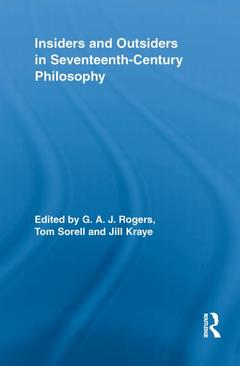Description
Insiders and Outsiders in Seventeenth-Century Philosophy
Routledge Studies in Seventeenth-Century Philosophy Series
Coordinators: Rogers G.A.J., Sorell Tom, Kraye Jill
Language: English
Subject for Insiders and Outsiders in Seventeenth-Century Philosophy:
Keywords
Young Man; early; Leibniz’s Metaphysics; modern; True Intellectual System; leibnizs; Leibniz’s Philosophy; metaphysics; Acta Eruditorum; cambridge; Edward Stillingfl Eet; platonists; Infi Nite Attributes; true; Early Modern Philosophy; intellectual; Locke’s Philosophy; system; Early Modern Metaphysics; acta; Gassendi’s Philosophy; Syntagma Philosophicum; Historico Political Discourse; Nicolas Claude Fabri De Peiresc; Spinoza’s Life; Cambridge Platonists; Covenant Theology; Natura Naturata; Natura Naturans; Van Velthuysen; Royale Des Sciences; Benjamin Whichcote; Fi Rst Covenant; Deus Sive Natura; Foucault’s Refl Ection
Publication date: 02-2013
Support: Print on demand
Publication date: 09-2009
· 15.2x22.9 cm · Hardback
Description
/li>Contents
/li>Readership
/li>Biography
/li>
Seventeenth-century philosophy scholars come together in this volume to address the Insiders--Descartes, Spinoza, Leibniz, Locke, and Hobbes--and Outsiders--Pierre Gassendi, Kenelm Digby, Theophilus Gale, Ralph Cudworth and Nicholas Malebranche--of the philosocial canon, and the ways in which reputations are created and confirmed. In their own day, these ten figures were all considered to be thinkers of substantial repute, and it took some time for the Insiders to come to be regarded as major and original philosophers. Today these Insiders all feature in the syllabi of most history of philosophy courses taught in western universities, and the papers in this collection, contrasting the stories of their receptions with those of the Outsiders, give an insight into the history of philosophy which is generally overlooked.
Acknowledgments Introduction: The Creation of the Canon, G.A.J. Rogers Part I: Outsiders Chapter One: Becoming an Outsider: Gassendi in the History of Philosophy, Margaret J. Osler Chapter Two: Sir Kenelm Digby, Recusant Philosopher, John Henry Chapter Three: Theophilus Gale and Historiography of Philosophy, Stephen Pigney Chapter Four: The Standing of Ralph Cudworth as a Philosopher, Benjamin Carter Chapter Five: Nicholas Malebranche: Insider or Outsider?, Andrew Pyle Part II: Insiders Chapter Six: Excusable Caricature and Philosophical Relevance: The Case of Descartes, Tom Sorell Chapter Seven: Descartes’s Reputation, John Cottingham Chapter Eight: The Political Motivations of Heidegger’s anti-Cartesianism, Emmanuel Faye Chapter Nine: Hobbes’s Reputation in Anglo-American Philosophy, Tom Sorell Chapter Ten: A Farewell to Leviathan: Foucault and Hobbes on Power, Sovereignty and War, Luc Foisneau Chapter Eleven: Spinoza’s Past and Present, Wiep van Bunge Chapter Twelve: Benedictus Patheissimus, Steven Nadler Chapter Thirteen: The Standing and Reputation of John Locke, G.A.J. Rogers Chapter Fourteen: The Reputation of Locke’s General Philosophy in Britain in the Twentieth Century, Michael Ayers Chapter Fifteen: Leibniz’s Reputation: The Fontenelle Tradition, Daniel Garber Chapter Sixteen: Leibniz‘s Reputation in the Eighteenth century: Kant and Herder, Catherine Wilson Chapter Seventeen: The Reception of Leibniz’s Philosophy in the Twentieth Century, Robert Merrihew Adams Contributor Biographies Index
G. A. J. Rogers is Editor of the British Journal for the History of Science, and a Professor of the History of Philosophy at Keele University.
Tom Sorrell is Professor of Philosophy at the University of Birmingham.
Jill Kraye is Professor of History of Renaissance Philosophy at the Warburg Institute.
These books may interest you

Ralph Cudworth 47.09 €



